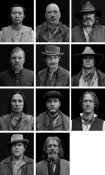Stan Douglas
dal 9/1/2007 al 9/2/2007
Segnalato da
9/1/2007
Stan Douglas
David Zwirner, New York

Klatsassin
David Zwirner is pleased to present the first U.S. viewing of Klatsassin, an
exhibition of new work by Canadian artist Stan Douglas. In 2006, Klatsassin premiered at the Vienna
Secession in Vienna, Austria. The exhibition at David Zwirner is concurrent with Stan Douglas: Inconsolable
Memories at The Studio Museum in Harlem, on view through March 18, 2007, which features a major work: a
16mm film based in part on Toma's Gutie'rrez Alea’s 1968 film, Memorias del Subdesarrollo (Memories of
Underdevelopment). Douglas recently co-curated Beyond Cinema: The Art of Projection, Films, Videos, and
Installations from 1963 to 2005 at Hamburger Bahnhof in Berlin, Germany (through February 4, 2007). A
monograph of Douglas’ work from the Friedrich Christian Flick Collection was recently published by Dumont.
Stan Douglas has exhibited at many major instutitions in the United States and abroad, including DIA Center
for the Arts, New York, NY; Hamburger Bahnhof, Berlin, Germany; Solomon R. Guggenheim Museum, New
York, NY; Museum of Modern Art, New York, NY; The Art Institute of Chicago, Chicago, IL; Kunsthalle
Zurich, Zurich, Switzerland; Tate Modern, London, England; Whitney Museum of American Art, New York,
NY; Museum of Contemporary Art, Los Angeles, CA; Moderna Museet, Stockholm, Sweden; and Centre
Georges Pompidou, Paris, France, among many others. He has participated in several biennials including
Venice, Sao Paolo, Istanbul, Berlin, Sydney, and Liverpool. This will be Douglas’ eighth solo exhibition at
David Zwirner.
Klatsassin takes its title from a Tsilhqot’in chief (the Tsilhqot’in are Athapascan-speaking Aboriginal people in
British Columbia) and will include two series of photographs and a high-definition video projection. The
video, set in 1864 in the forests of Canada’s Cariboo Mountains, focuses on the hostility between the
Tsilhqot’in tribe and encroaching settlers seeking gold on the Chilcotin Plateau. Klatsassin led an insurgency
but at first evaded capture. He was eventually lured with the gift of tobacco, taken prisoner, tried for murder,
and hanged.
Like many of Douglas’ previous works, most notably Journey into Fear (2001) and Suspiria (2003), Klatsassin
is a recombinant work - essentially non-linear, it defies the limitations of a traditional film format by having no
real beginning or end. Referencing Akira Kurosawa’s legendary film Rashomon (1950), in which a plot is
described in several contradictory ways, in Klatsassin a murder unfolds through flashbacks, time shifts,
ambiguous cuts, and multiple perspectives. Douglas refers to the film as a “dub western," as its multi-layered
plot develops much like a musical composition, with five levels of narration that interrupt and overlap one
another. The soundtrack was composed by contemporary Berlin dub project, Rhythm & Sound.
Also on display will be two series of photographs; the first a group of cinematic-format landscapes and
interiors in British Columbia - Stanley Cemetery, a Masonic Lodge in Barkerville, the Maritime Worker’s Hall
and McLeod’s Books in Vancouver, Quesnel Forks, Walhachin, and Spences Bridge - the second a series of
black and white portraits of the characters from Klatsassin.
Opening on January 10, 2007
David Zwirner
525 West 19th Street - New York
Free admission



